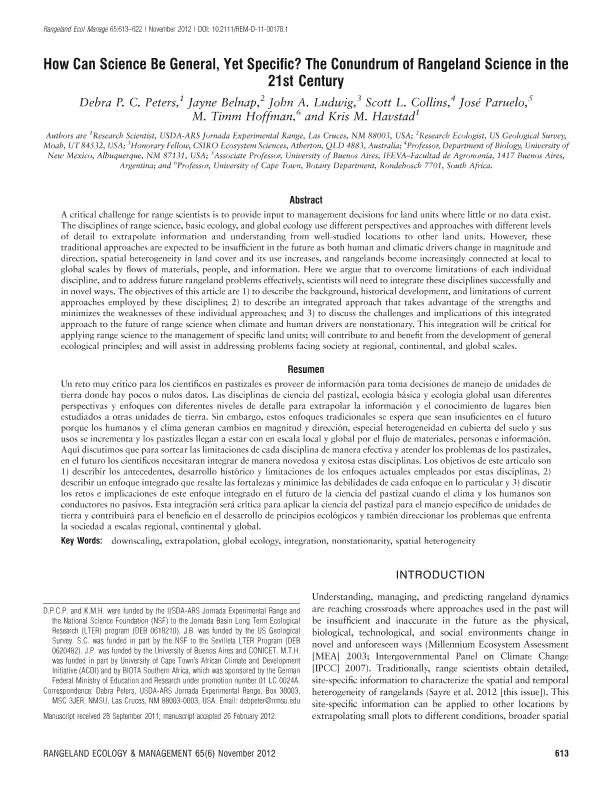Mostrar el registro sencillo del ítem
dc.contributor.author
Peters, Debra P. C.

dc.contributor.author
Belnap, Jayne

dc.contributor.author
Ludwig, John A.

dc.contributor.author
Collins, Scott L.

dc.contributor.author
Paruelo, José

dc.contributor.author
Hoffman, M. Timm

dc.contributor.author
Haystad, Kris M.

dc.date.available
2017-06-05T19:10:07Z
dc.date.issued
2012-11
dc.identifier.citation
Peters, Debra P. C.; Belnap, Jayne; Ludwig, John A.; Collins, Scott L.; Paruelo, José; et al.; How can science be general, yet specific? The conundrum of rangeland science in the 21st century; Society For Range Management; Rangeland Ecology And Management; 65; 6; 11-2012; 613-622
dc.identifier.issn
1550-7424
dc.identifier.uri
http://hdl.handle.net/11336/17512
dc.description.abstract
A critical challenge for range scientists is to provide input to management decisions for land units where little or no data exist. The disciplines of range science, basic ecology, and global ecology use different perspectives and approaches with different levels of detail to extrapolate information and understanding from well-studied locations to other land units. However, these traditional approaches are expected to be insufficient in the future as both human and climatic drivers change in magnitude and direction, spatial heterogeneity in land cover and its use increases, and rangelands become increasingly connected at local to global scales by flows of materials, people, and information. Here we argue that to overcome limitations of each individual discipline, and to address future rangeland problems effectively, scientists will need to integrate these disciplines successfully and in novel ways. The objectives of this article are 1) to describe the background, historical development, and limitations of current approaches employed by these disciplines; 2) to describe an integrated approach that takes advantage of the strengths and minimizes the weaknesses of these individual approaches; and 3) to discuss the challenges and implications of this integrated approach to the future of range science when climate and human drivers are nonstationary. This integration will be critical for applying range science to the management of specific land units; will contribute to and benefit from the development of general ecological principles; and will assist in addressing problems facing society at regional, continental, and global scales.
dc.description.abstract
Un reto muy crítico para los científicos en pastizales es proveer de información para toma decisiones de manejo de unidades de tierra donde hay pocos o nulos datos. Las disciplinas de ciencia del pastizal, ecología básica y ecología global usan diferentes perspectivas y enfoques con diferentes niveles de detalle para extrapolar la información y el conocimiento de lugares bien estudiados a otras unidades de tierra. Sin embargo, estos enfoques tradicionales se espera que sean insuficientes en el futuro porque los humanos y el clima generan cambios en magnitud y dirección, especial heterogeneidad en cubierta del suelo y sus usos se incrementa y los pastizales llegan a estar con en escala local y global por el flujo de materiales, personas e información. Aquí discutimos que para sortear las limitaciones de cada disciplina de manera efectiva y atender los problemas de los pastizales, en el futuro los científicos necesitaran integrar de manera novedosa y exitosa estas disciplinas. Los objetivos de este articulo son 1) describir los antecedentes, desarrollo histórico y limitaciones de los enfoques actuales empleados por estas disciplinas, 2) describir un enfoque integrado que resalte las fortalezas y minimice las debilidades de cada enfoque en lo particular y 3) discutir los retos e implicaciones de este enfoque integrado en el futuro de la ciencia del pastizal cuando el clima y los humanos son conductores no pasivos. Esta integración sera crítica para aplicar la ciencia del pastizal para el manejo específico de unidades de tierra y contribuirá para el beneficio en el desarrollo de principios ecológicos y también direccionar los problemas que enfrenta la sociedad a escalas regional, continental y global.
dc.format
application/pdf
dc.language.iso
eng
dc.publisher
Society For Range Management

dc.rights
info:eu-repo/semantics/openAccess
dc.rights.uri
https://creativecommons.org/licenses/by-nc-sa/2.5/ar/
dc.subject
Downscaling
dc.subject
Extrapolation
dc.subject
Global Ecology
dc.subject
Integration
dc.subject
Nonstationarity
dc.subject
Spatial Heterogeneity
dc.subject.classification
Ecología

dc.subject.classification
Ciencias Biológicas

dc.subject.classification
CIENCIAS NATURALES Y EXACTAS

dc.title
How can science be general, yet specific? The conundrum of rangeland science in the 21st century
dc.type
info:eu-repo/semantics/article
dc.type
info:ar-repo/semantics/artículo
dc.type
info:eu-repo/semantics/publishedVersion
dc.date.updated
2017-05-22T20:48:04Z
dc.journal.volume
65
dc.journal.number
6
dc.journal.pagination
613-622
dc.journal.pais
Estados Unidos

dc.journal.ciudad
Littleton
dc.description.fil
Fil: Peters, Debra P. C.. United States Department Of Agriculture. Agriculture Research Service; Estados Unidos
dc.description.fil
Fil: Belnap, Jayne. United States Geological Survey; Estados Unidos
dc.description.fil
Fil: Ludwig, John A.. Commonwealth Scientific and Industrial Research Organisation; Australia
dc.description.fil
Fil: Collins, Scott L.. University Of New Mexico; Estados Unidos
dc.description.fil
Fil: Paruelo, José. Consejo Nacional de Investigaciones Científicas y Técnicas. Oficina de Coordinación Administrativa Parque Centenario. Instituto de Investigaciones Fisiológicas y Ecológicas Vinculadas a la Agricultura. Universidad de Buenos Aires. Facultad de Agronomía. Instituto de Investigaciones Fisiológicas y Ecológicas Vinculadas a la Agricultura; Argentina
dc.description.fil
Fil: Hoffman, M. Timm. University of Cape Town; Sudáfrica
dc.description.fil
Fil: Haystad, Kris M.. United States Department Of Agriculture. Agriculture Research Service; Estados Unidos
dc.journal.title
Rangeland Ecology And Management

dc.relation.alternativeid
info:eu-repo/semantics/altIdentifier/doi/http://dx.doi.org/10.2111/REM-D-11-00178.1
dc.relation.alternativeid
info:eu-repo/semantics/altIdentifier/url/http://www.sciencedirect.com/science/article/pii/S1550742412500965?via%3Dihub
Archivos asociados
